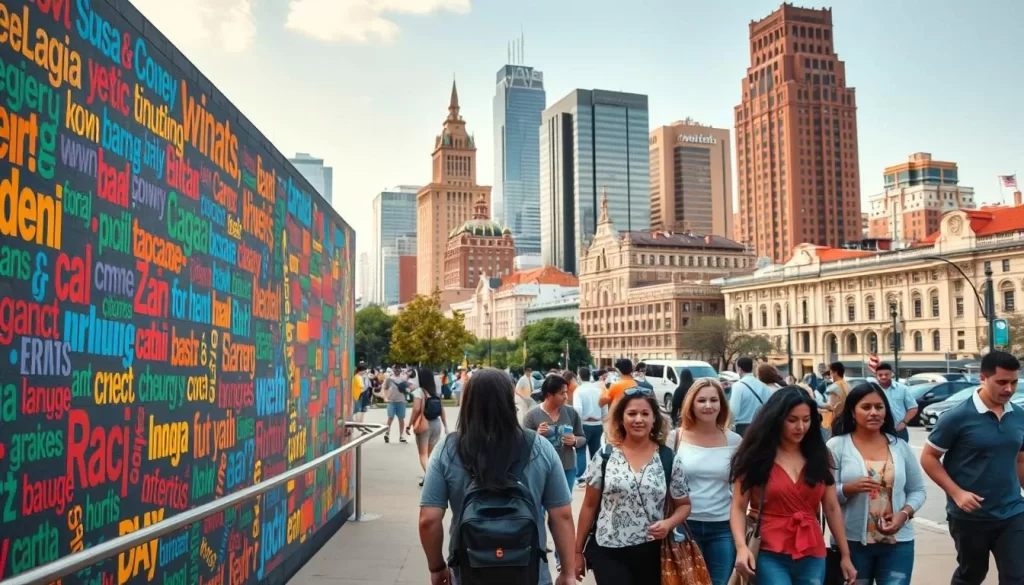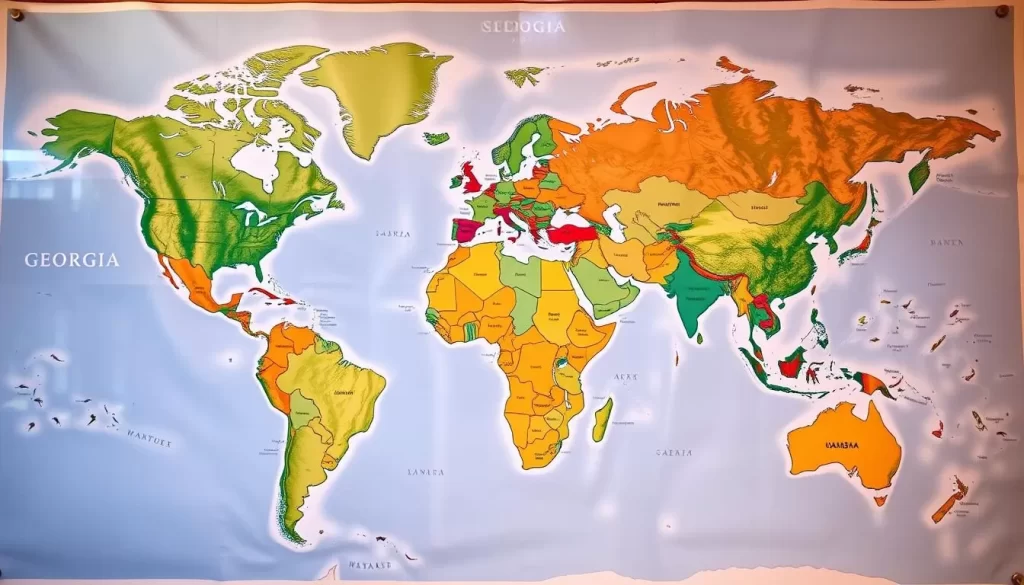✓ Accommodations✓ Flights✓ Rental Cars✓ Tours & Activities
You’re about to explore the rich linguistic tapestry that makes Georgia one of America’s most culturally diverse states. With a population of nearly 10.8 million, the state’s language landscape is fascinating.
An estimated 14.0 percent of residents above the age of four speak a language other than English at home, totaling around 1.5 million people. This diversity has significant implications for various industries, including healthcare and government services.
As you delve into Georgia’s language landscape, you’ll discover the historical immigration patterns that have shaped its linguistic diversity over time. You’ll also gain insights into the challenges faced by residents with limited English proficiency and the translation services available to bridge communication gaps.
The Linguistic Landscape of Georgia
As you explore Georgia, you’ll discover a state with a complex linguistic profile shaped by its history and immigration patterns. The state’s linguistic diversity is a result of various languages being spoken among its population.
English as the Official State Language
English serves as Georgia’s official state language, established through legislation that recognizes it as the primary language for government operations and official documents. This designation ensures that English is the predominant language used in official capacities, facilitating communication among residents and government entities. As a result, you’ll find that English is widely spoken and understood across the state, making it easier for residents and visitors to navigate everyday tasks.

Language Diversity Statistics
Georgia’s population of nearly 10.8 million residents is linguistically diverse, with approximately 14% of people over age four speaking a language other than English at home. This translates to around 1.5 million residents who speak languages other than English, highlighting the state’s multicultural nature. Some key statistics that illustrate this diversity include:
- Approximately 5.73% of Georgia’s population (about 618,815 people) has limited English proficiency (LEP), creating unique challenges for accessing services.
- Georgia’s linguistic landscape directly reflects its immigration history, with language communities often concentrated in specific regions of the state.
- The state’s government and institutions have adapted to serve residents who speak languages other than English, including translation services and multilingual resources.
These statistics demonstrate the importance of language diversity in Georgia and the need for inclusive language services to support its residents.
Top 10 Languages Spoken in Georgia, United States
As you explore the linguistic diversity of Georgia, United States, you’ll discover the top languages spoken across the state. Georgia’s population is a melting pot of different cultures, resulting in a diverse linguistic landscape. This diversity is reflected in the various languages spoken at home by its residents.
Spanish: Georgia’s Most Common Non-English Language
Spanish is the most widely spoken non-English language in Georgia, with 781,103 speakers making up nearly 7.92% of the population. This significant presence is a result of the large Hispanic community in the state. The widespread use of Spanish is evident in various aspects of life, including business, education, and healthcare.
Asian Languages: Vietnamese, Chinese, and Korean
Asian languages are also prominent in Georgia, with Vietnamese, Chinese, and Korean being the most common. Vietnamese is spoken by 52,832 individuals, representing about 0.54% of the population. Chinese, including Cantonese and Mandarin, is spoken by 51,251 people, making up 0.52% of the population. Korean is spoken by 47,879 residents, accounting for approximately 0.49% of the state’s population.
| Language | Number of Speakers | Percentage of Population |
|---|---|---|
| Vietnamese | 52,832 | 0.54% |
| Chinese | 51,251 | 0.52% |
| Korean | 47,879 | 0.49% |
European Languages: French and German
European languages also have a presence in Georgia, with French and German being notable examples. French, including Cajun, is spoken by 36,896 individuals, representing about 0.37% of the population. German is spoken by 22,664 people, making up 0.23% of the state’s population.
African Languages: Yoruba, Twi, and Igbo
African languages, such as Yoruba, Twi, and Igbo, are also spoken in Georgia. These languages are spoken by 33,742 individuals, representing approximately 0.34% of the population. The presence of these languages reflects the diverse immigration patterns in the state.
Indian Languages: Hindi and Gujarati
Indian languages, including Hindi and Gujarati, are also prominent in Georgia. Hindi is spoken by 31,912 people, making up about 0.32% of the population. Gujarati is spoken by 23,356 individuals, representing 0.24% of the state’s population.

The top 10 languages spoken in Georgia reflect the state’s diverse cultural landscape. These languages are not only spoken at home but also influence various aspects of life in Georgia, including business, education, and healthcare. As the state’s population continues to grow, understanding the linguistic diversity becomes increasingly important for providing effective services and meeting the needs of all residents.
Immigration History and Its Impact on Georgia’s Languages
As you explore Georgia’s rich history, you’ll discover how immigration has shaped the state’s linguistic landscape. Georgia has become one of the most populous states in the nation, with a diverse population that predates European settlement.
Early Settlement and European Influence
Indigenous populations were well-established in the region before the arrival of Europeans in the 1500s. By the 1700s, British settlement was on the rise, leading to conflicts with native peoples as more European settlers arrived and expanded westward. This early settlement period laid the groundwork for the linguistic diversity seen in Georgia today.
Modern Immigration Patterns
In modern times, immigrants from Asia and Central America have become increasingly common, contributing to the state’s linguistic diversity. Although their numbers are smaller compared to those of European or African descent, they have added new languages to the state’s cultural tapestry. As a result, Georgia’s population has become even more diverse, with a wide array of languages being spoken across the state.
Cultural Enclaves and Language Preservation
Immigrant communities have established cultural enclaves where their languages are preserved and celebrated. These communities have also developed language preservation efforts, including heritage language schools and cultural centers. This has helped maintain linguistic traditions and contributed to the rich cultural heritage of Georgia.

| Immigration Period | Primary Languages Introduced | Impact on Georgia’s Linguistic Landscape |
|---|---|---|
| Pre-Colonial | Indigenous languages | Established initial linguistic diversity |
| 1700s European Settlement | English | English became the dominant language |
| Plantation Economy | African languages | Influenced regional dialects and cultural expressions |
| Modern Immigration | Asian and Central American languages | Further diversified Georgia’s language profile |
Georgia’s government and service providers have adapted to the state’s growing diversity by developing translation services and localization strategies. This ensures effective communication across the state’s diverse population, supporting the needs of various language speakers.
Limited English Proficiency in Georgia
As you explore the linguistic landscape of Georgia, you’ll find that a significant portion of the population faces challenges due to limited English proficiency. Around 5.73% of Georgia’s population, which translates to approximately 618,815 residents, speak English less than “very well” according to census definitions. This demographic reality underscores the need for effective language access services to ensure that everyone can access essential services and opportunities.
Statistics and Demographics
The demographics of Georgia’s limited English proficiency population reveal that Spanish speakers are the largest group, followed by speakers of Vietnamese, Chinese, and Korean. The LEP status varies significantly by age, education level, and household income, which has important implications for how services are designed and delivered to these populations. For instance, understanding the age distribution and educational background of LEP individuals can help tailor language access services to their specific needs.

Language Access Services and Resources
To address the challenges faced by LEP individuals, Georgia offers a range of language access services, including interpretation services (in-person, over-the-phone, and video remote), document translation, and cultural competency training for service providers. Organizations like Acutrans provide certified document translations in 24 hours or less and offer top-tier interpretation services covering over 200 languages. Additionally, technology is improving language access through translation apps, multilingual websites, and remote interpretation services that can connect people with interpreters in over 200 languages at any time.
By leveraging these services and resources, you can ensure that LEP individuals in Georgia have meaningful access to essential services like healthcare, education, legal assistance, and government programs. This not only promotes equity but also supports the well-being and integration of diverse populations within the state.
Conclusion: Embracing Georgia’s Linguistic Diversity
Georgia’s linguistic diversity is a rich tapestry, woven from the threads of various languages and cultures. As you’ve gained a comprehensive understanding of the state’s linguistic landscape, you’ll appreciate how it reflects America’s identity as a nation of immigrants.
The diverse array of languages spoken in Georgia represents both challenges and opportunities for residents, businesses, and healthcare providers. By embracing language diversity through translation services and cultural competency, you can create more inclusive communities and effective services for all Georgia residents.
As Georgia continues to attract new residents, its linguistic landscape will evolve. Addressing language barriers is essential for ensuring equal access to vital resources, such as healthcare and education, for all residents regardless of their linguistic background or age. With industry-leading language services providers like Acutrans, you can get top-notch results every time, meeting your language services needs.
The above is subject to change.
Check back often to TRAVEL.COM for the latest travel tips and deals.






